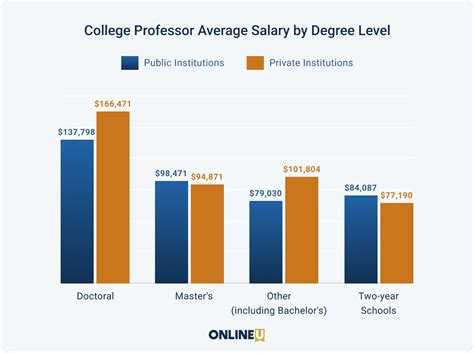A career as a university professor offers a unique blend of intellectual pursuit, mentorship, and the opportunity to contribute to society's knowledge base. But beyond the passion for research and teaching, what is the financial reality of this esteemed profession? For those considering the long road of graduate school and academic training, understanding the potential salary is a crucial step in career planning.
The answer is complex, as a professor's salary can range from modest to highly lucrative. While the national average provides a solid benchmark, your actual earnings will be shaped by a combination of your academic rank, institution type, geographic location, and field of study. This guide breaks down the data to give you a clear picture of the earning potential in academia.
What Does a University Professor Do?

Before diving into the numbers, it's essential to understand the multifaceted role of a university professor. Their responsibilities are traditionally built on three core pillars:
1. Teaching and Mentorship: This includes designing courses, delivering lectures, leading seminars, grading assignments, and advising undergraduate and graduate students on their academic and career paths.
2. Research and Scholarship: Professors are expected to be active researchers in their field. This involves conducting original research, writing and publishing scholarly articles and books, presenting findings at conferences, and securing grant funding to support their work.
3. Service: This involves administrative and committee work for their department, the university, and the broader academic community. This can include serving on hiring committees, curriculum development boards, and editorial boards for academic journals.
The balance of these duties varies significantly based on the type of institution. A professor at a major research university (an "R1" institution) will spend a significant portion of their time on research, while a professor at a liberal arts or teaching-focused college will have a heavier teaching load.
Average University Professor Salary

When looking at salary data, it's important to consider different sources. The U.S. Bureau of Labor Statistics (BLS) groups all "Postsecondary Teachers" together, which is a broad category.
- According to the U.S. Bureau of Labor Statistics (BLS), the median annual wage for postsecondary teachers was $84,380 in May 2023. The lowest 10 percent earned less than $45,720, and the highest 10 percent earned more than $185,730.
Salary aggregators provide a more focused look at the specific title of "University Professor," often reflecting data from more experienced, tenured faculty.
- Salary.com reports the average University Professor salary in the United States is $160,899 as of May 2024, with a typical range falling between $128,787 and $231,701.
- Glassdoor lists a total pay average of $144,244 per year, combining an estimated base pay of $105K with additional pay (bonuses, grants, etc.) of around $39K.
These figures show a wide variance. That's because the title "professor" is not a single job; it's a career track with multiple levels and variables that drastically impact earnings.
Key Factors That Influence Salary

The "average" salary is just a starting point. To truly understand your earning potential, you must consider the following key factors.
### Years of Experience and Academic Rank
Nowhere is experience more clearly tied to salary than in the hierarchical structure of academia. The tenure track is a progression that directly corresponds with increased earnings.
The American Association of University Professors (AAUP) provides the most detailed data on this in its annual *Faculty Compensation Survey*. According to their 2022-23 report, the average salaries by rank are:
- Full Professors: $152,067
- Associate Professors: $106,128
- Assistant Professors: $91,531
- Instructors/Lecturers: $66,616
This data clearly shows that achieving tenure and advancing from an Assistant to a Full Professor can result in a salary increase of over 65%. Non-tenure track roles like lecturers and adjuncts, who are often paid per course, typically have the lowest earnings.
### Institution Type
The type of university or college where you work is one of the biggest determinants of salary.
- Private vs. Public: According to the AAUP, faculty at private-independent (non-religious) doctoral universities have the highest average salaries. In 2022-23, a full professor at a private doctoral institution earned an average of $224,539, compared to $167,461 at a public doctoral institution.
- Research Intensity (Carnegie Classification): The most significant factor is the institution's research focus. "R1: Doctoral Universities – Very high research activity" pay the most because they compete for top-tier researchers who can attract major grant funding.
- Doctoral Universities (R1): Highest salaries.
- Master's Universities: Mid-range salaries.
- Baccalaureate Colleges (Liberal Arts): Lower-mid range salaries.
- Associate's Colleges (Community Colleges): Typically the lowest salaries of the four-year institutions.
### Area of Specialization
Your academic discipline has a massive impact on your paycheck, largely driven by market demand and opportunities for funding and consulting outside of academia.
- Top-Tier Fields: According to data from the College and University Professional Association for Human Resources (CUPA-HR), the disciplines commanding the highest salaries are consistently Law, Business, Engineering, Computer Science, and Health Sciences/Medicine. Professors in these fields at top universities can easily earn salaries well into the high six figures.
- Mid-Tier Fields: Physical sciences, social sciences (like economics and psychology), and mathematics fall into the middle range.
- Lower-Tier Fields: Disciplines in the Humanities, Education, Theology, and Visual and Performing Arts typically have the lowest average salaries.
The disparity is significant. A full professor in business or law can earn more than double what a full professor in the humanities earns at the very same university.
### Geographic Location
As with any profession, location and cost of living play a crucial role. States with a high concentration of prestigious universities and a high cost of living tend to offer higher salaries.
According to the BLS, the top-paying states for postsecondary teachers are:
1. New York: $118,500 (Annual Mean Wage)
2. California: $116,630
3. Massachusetts: $112,020
4. New Jersey: $105,790
5. Alaska: $103,510
Working in a major metropolitan area like New York City, Boston, or the San Francisco Bay Area will almost always come with a higher salary than a similar position in a rural or lower-cost-of-living area.
Job Outlook

The demand for university professors is steady but highly competitive. The BLS projects that employment for postsecondary teachers will grow by 8 percent from 2022 to 2032, which is much faster than the average for all occupations. This translates to about 103,500 openings each year, on average, primarily due to the need to replace workers who retire or leave the profession.
However, a crucial piece of context is the competition for tenure-track positions. These coveted roles are limited, and the number of PhD graduates often exceeds the number of available tenure-track jobs, especially in the humanities and social sciences. Many openings will be for part-time adjunct or non-tenure track positions.
Conclusion: Is a Career as a Professor Right for You?

A career as a university professor is a marathon, not a sprint, requiring years of dedicated study and research. While the "average" salary of around $84,000 provides a baseline, it doesn't tell the whole story.
Your true earning potential is a dynamic equation:
- Path to Six Figures: Reaching a six-figure salary is highly achievable, especially upon reaching the Associate or Full Professor rank at a doctoral or master's university.
- Path to High Earnings ($200k+): The highest salaries are reserved for full professors in high-demand fields like law, business, and engineering, particularly at elite private research universities in major metropolitan areas.
Beyond the salary, academia offers profound non-monetary rewards: intellectual autonomy, the joy of discovery, and the fulfillment of mentoring the next generation. For the right individual, it is a challenging but deeply satisfying career path with solid, and at times exceptional, financial potential.
